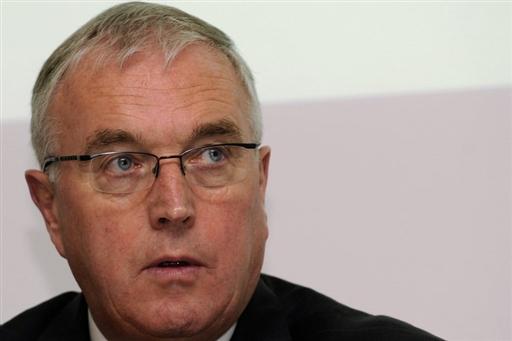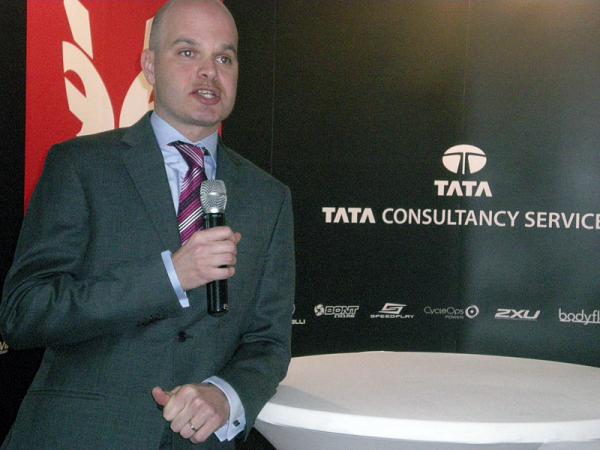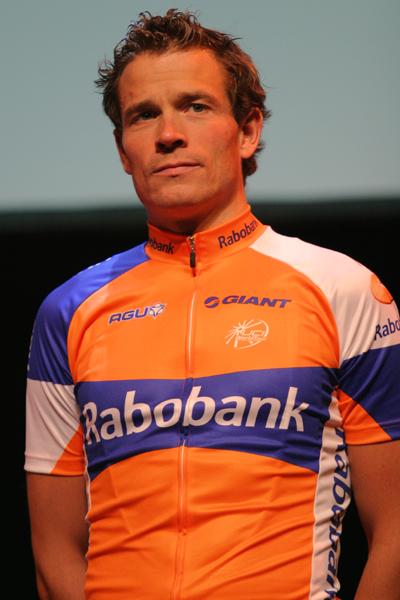McQuaid to meet with team representatives on radio ban
UPDATED: UCI confirms meeting; Voices pro and contra on the issue



The planned protest against the race radio ban did not occur at the Omloop Het Nieuwsblad on Saturday, but the issue has not gone away. UCI president Pat McQuaid is to meet with various team management representatives this week on the ban. Meanwhile more and more of those involved in the issue are speaking out, including Cervelo's Gerard Vroomen, FDJ Sport Director Marc Madiot and Rabobank rider Grischa Niermann.
McQuaid is scheduled to meet in Switzerland with Bjarne Riis (Saxo Bank), Patrick Lefevere (Quick Step), Harold Knebel (Rabobank) and possibly Geert Coeman of Omega Pharma-Lotto.
UCI spokesman Enrico Carpani confirmed the meeting this coming Thursday at the UCI headquarers in Aigle. "They asked for this meeting, and Mr. McQuaid - who is always available to listen the opinions of members of cycling world - didn't see any problem in accepting it,” he told Cyclingnews. “Hopefully the discussion will be open and constructive, which doesn't mean at all, however, that the UCI will reconsider its decision to progressively ban earpieces.”
“McQuaid is now willing to talk about safety,” Coeman told Sportwereld.be. “I do not expect him to change his mind completely on Thursday, but there is still a small opening in the debate.”
Coeman cited a survey done earlier this year by the CPA, the association of professional cyclists, which asked 344 members for their opinion. 60% were in favour of unrestricted radio usage and 28% in favour of using it for Radio Tour, passing on only safety information and times gaps. Only 11 percent called for a complete ban.
Vroomen: those involved must have input
There are many issues involved in the proposed radio ban, but the biggest is “changes being made without proper input from those involved,” according to Gerard Vroomen, co-founder of Cervelo Cycles.
The latest race content, interviews, features, reviews and expert buying guides, direct to your inbox!
The teams and the riders must share a bit of the blame, he said in his blog on Cervelo.com, for not speaking up previously, when they had a chance. “And now that it's almost too late, they wake up.”
As for him personally, “I don’t like the radios, but I will support any movement in favour of radios if that’s what the majority wants, on the basis that it’s the bigger picture that counts.”
Vroomen disagreed with the theory that riders are “remote-controlled by the sports directors in the car. There are certainly teams and riders where this applies to some degree, but in many teams it doesn't, especially in the classics.”
He added, “Radios may have a bigger effect in sprint stages, where the peloton now often catches the breakaway with laser precision. However, those who think a radio ban will give the breakaway a bigger chance may be mistaken, the tactical adjustment from the sprinter teams would likely be to run less risk and shut down breakaways sooner, leading to a less interesting race.”
The safety issue is a major one. If the radios are banned, “then it should be coupled with an extremely strict liability for the race organisers and sanctioning body that the course be safe.”
A related safety issue is that “sports directors now have to make crazy manoeuvres to talk to the riders.” He acknowledged, though, that “stupid driving behaviour has little to do with radios, it is ingrained in this sport where the people driving cars (sports directors, soigneurs, journalists, etc) sometimes feel way more important than they really are in the grand scheme of things. A radio ban would certainly increase the number of opportunities they have to act stupidly, but it’s not the real cause.”
Madiot: Riders aren't sheep
Marc Madiot, FDJ Sports Director, was one of the few voicing support of the ban. “I would not like to have someone yelling in my ear all day telling me what to do, turn left, turn right, watch out here, watch out there. The riders aren't sheep, are they?”
"With the abolition of the radios, they will have more responsibility in the race,” he told the Belga news agency. “That can't be bad.”
"Talk to us riders”: Niermann
Rabobank has been one of the most vocal teams in support of keeping the race radios, and now veteran Grischa Niermann, who has been with the team since 1999, has issued an open letter to McQuaid, questioning the ban.
"What exactly is the point” of the ban, he asked on Radsport-News.com. “Do you really think that this rule change will free cycling from its image problem?”
Radio communications are not the biggest problem facing the sport at the moment, the 35-year-old said. “The UCI should use all its energy to finally clear up the Contador case or prohibit another Riccò case, but instead of that, with the radio ban, they introduce a secondary issue, which splits cycling in two.
"Cycling finds itself in a difficult situation at this time, and in my opinion, it would be very helpful if the UCI, organisers, teams and riders could all work together to make our sport popular again.”
Niermann concluded with an echo of Vrooman's remarks. “Perhaps you have good grounds for a radio ban, but please get in contact with us riders and explain your position to us. That has not yet happened and that is exactly why this new rule strikes us as fully arbitrary.”